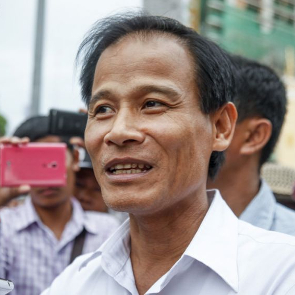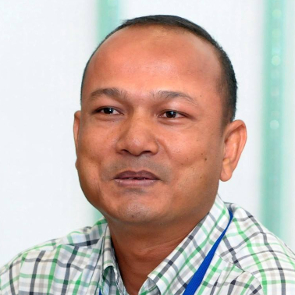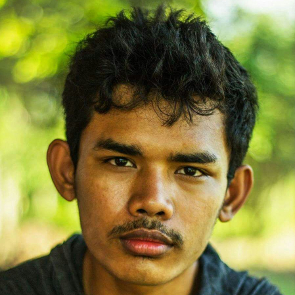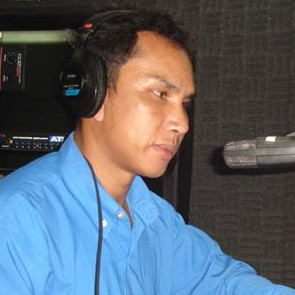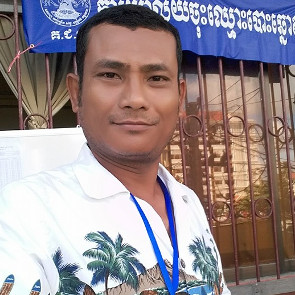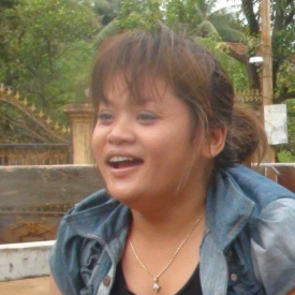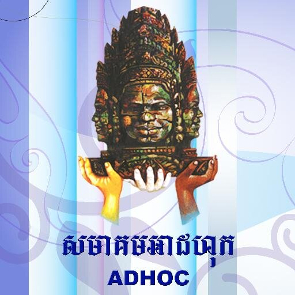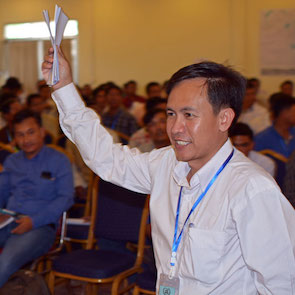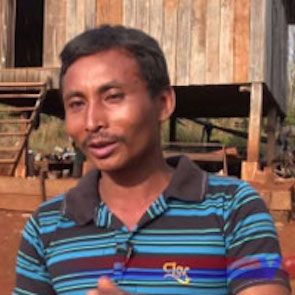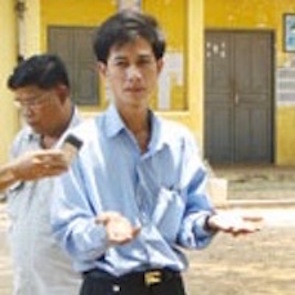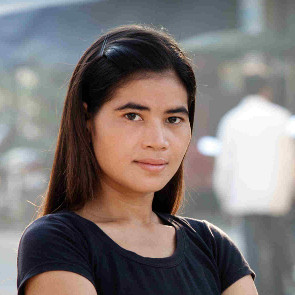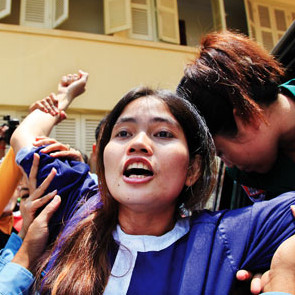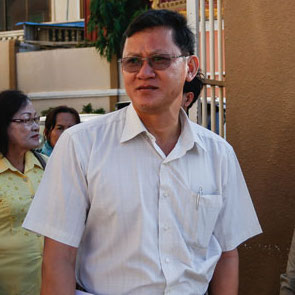UPR Submission - Cambodia 2018
Submission to the 3nd Session of the Universal Period Review, January 2019
Date Submitted: 12 July 2018
INTRODUCTION AND KEY CONCERNS
1. In Cambodia, the crackdown on the rights to freedom of expression, association and peaceful assembly intensified ahead of the national elections in July 2018. The authorities’ misuse of the judicial system to silence human rights defenders (HRDs) and critical voices increased, while the security forces continued to harass and intimidate civil society members and HRDs.
2. HRDs faced threats, physical attacks, arrest, judicial harassment and arbitrary detention for peacefully carrying out their human rights work. Intimidation, judicial harassment and heavy surveillance caused several to leave the country in fear for their safety. Peaceful protests continued to be hampered by the authorities. Prominent human rights organisations were threatened with closure and at least one international NGO was forced to close.
3. Defenders working against deforestation and illegal logging, as well as corrupt practices surrounding Economic Land Concessions1, are one of the most vulnerable groups of human rights defenders targeted by state authorities. Community activists protesting against land grabbing and forced evictions have faced fabricated charges and jail terms (see below). Civil society groups that work on justice and political rights have also faced significant harassment, especially in the lead up to the 2018 elections. Peaceful protests and demonstrations have been regularly shut down or dispersed. Scores of HRDs exercising their rights to freedom of expression and assembly have been arrested or physically attacked.
DEVELOPMENTS SINCE LAST UPR
4. Cambodia accepted eight recommendations related to HRDs in the previous UPR cycle, held in 2014. One recommendation called for enacting laws and legislation that would enable defenders to exercise their rights to freedom of expression, association and peaceful assembly (Colombia). Despite accepting this recommendation, Cambodia has enacted legislation that could restrict the ability of HRDs and civil society organisations to properly function (see below).
5. In a systemic crackdown on the freedom of expression and on media, the Ministry of Broadcasting closed 15 independent radio stations across Cambodia using the pretext of tax and administrative violations in August 2017. Phnom Penh-based radio station Moha Nokor and three affiliated stations, which aired shows produced by Voice of America, Radio Free Asia and the Cambodia National Rescue Party (CNRP), were instructed to stop operations. In September 2017, independent newspaper The Cambodia Daily was also targeted with a $6.3 million tax bill and was forced to shut down amidst allegations of tax fraud.
6. Cambodia accepted recommendations that called for protecting and respecting the rights of HRDs (Chile, Germany), and for an environment to allow them to conduct their work without ‘hindrance, intimidation and harassment’ (Austria). Front Line Defenders has documented numerous cases of intimidation and harassment of defenders since Cambodia’s last UPR, particularly by state authorities. Judicial harassment remains the most commonly used method to target human rights defenders.
7. Cambodia accepted a recommendation made by France specifically calling on the authorities to take necessary measures for the protection of HRDs through ‘prosecuting the perpetrators of violence against, or the intimidation of, them’. However, according to the data collected by Front Line Defenders since 2014, state authorities are the most frequent perpetrators of violence and intimidation against HRDs and are almost never held accountable. In cases where legal proceedings are initiated against non-state perpetrators, progress is very slow with many cases taking years to reach a conclusion.
8. Prime Minister Hun Sen and other senior state officials frequently engaged in rhetoric damaging to civil society, including implying that some groups which exercised their freedom of expression were attempting to organise ‘colour revolutions'.2 The Prime Minister specifically threatened prominent human rights organisations with closure, and individual defenders with legal action. In November 2017, the Supreme Court dissolved the main opposition party - CNRP - effectively removing the only electoral threat to the Prime Minister’s three decade long grip on power. Party leader Kem Sokha was arrested in September 2017 over allegations of treason, with the Prime Minister accusing him of conspiring with the United States to topple his regime. Following his arrest, the Ministry of Interior filed a complaint to dissolve the party as it believed that CNRP was also involved in this plot.
RESTRICTIVE LEGISLATIVE AND ADMINISTRATIVE FRAMEWORK
9. The Cambodian authorities used legislation and the judicial system to restrict free speech, jail government critics, and disperse workers, trade union representatives and farmers when engaging in peaceful assembly. The crackdown on human rights defenders and civil society has intensified in the last two years.
10. On 15 July 2015, the Cambodian National Assembly passed the controversial Law on Associations and Non-Governmental Organizations (LANGO). Foreign NGOs face severe restrictions through stricter penalties and reporting requirements. Article 17 of the law allows termination of a foreign NGO’s Memorandum of Understanding with the government if their activities are deemed to “jeopardize peace, stability, public order or harm the national security, national unity, culture, customs and traditions of the Cambodian national society.” Vague formulations and strict regulations within the approved Law allow the Cambodian Ministry of the Interior to deny registration, terminate or suspend groups, and to act arbitrarily against foreign organizations without providing legitimate justification.
11. On 26 November 2017, Prime Minister Hun Sen called for an investigation into the Cambodian Centre for Human Rights (CCHR) with a view to its potential closure. The Prime Minister accused the organisation of relaying foreign influence and being linked to the dissolved opposition party Cambodia National Rescue Party. The Prime Minister also asserted that the organisation had been founded by foreigners to serve their own interests, rather than the interests of the Khmer population. However, in the following week the Hun Sen announced that CCHR was free to continue its activities. CCHR is a prominent Cambodian NGO that works to promote and protect SOGIE rights, land rights, and respect for human rights.
12. Between August-November 2017, the Cambodian government used the LANGO to force the closure of the Cambodian office of National Democracy Institute. During this time authorities also de-registered the environmental NGO Mother Nature Cambodia and temporarily suspended the operations of land rights NGO Equitable Cambodia for alleged breaches of the LANGO. In February 2018, the Ministry of Interior announced that Equitable Cambodia was permitted to resume its operations.
JUDICIAL HARASSMENT
13. As outlined below, judicial harassment has been widely used in an attempt to restrict the work of HRDs, especially those working on land, environmental and labour rights. However, those working in other sectors have been also targeted with judicial harassment and the Cambodian authorities continue to bring false charges on a regular basis against HRDs or misuse existing laws to clamp down on protests.
14. On 28 April 2016, four senior staff of human rights organisation Cambodian Human Rights and Development Association (ADHOC) - Ny Sokha, Nay Vanda, Yi Soksan and Lim Mony, and an Election Commission official - Ny Chakrya (former ADHOC staff), were arrested by the Anti-Corruption Unit (ACU), and placed in custody in the Unit's compound in Phnom Penh. The five HRDs were interrogated for four days, first by ACU officers and then by the Prosecutor of the Phnom Penh Municipal Court. ADHOC was founded in 1991 to monitor the development and protection of human rights, in particular of land and natural resources rights. The defenders were released on bail in June 2017 after over a year in detention. They are still awaiting trail.
15. In a typical case of judicial harassment used to intimidate defenders, on 16 December 2015 Soum Chankea received two summons to appear at the Banteay Meanchey Provincial Court for questioning following his role in monitoring a peaceful demonstration two days previously. The demonstration had been organised by a local community which faced removal from its lands, after the land had been allocated by the government for the construction of a railway. The demonstration was deemed to be illegal by the local government. Soum Chankea is a provincial coordinator for the Banteay Meanchey province at the Cambodian Human Rights and Development Association (ADHOC).
HUMAN RIGHTS DEFENDERS MOST AT RISK
Defenders working on land rights and the environment
16. Judicial harassment against land rights activist Tep Vanny continued relentlessly, resulting in her arrest and imprisonment. She played a prominent role in mobilising the Boeung Kak Lake communities against government and private corporations' development plans and the evictions of community residents, for which she was eventually sentenced in 2012. She was arrested again on 15 August 2016 along with Bov Sophea by Duan Penh district security guards. She was charged with incitement to commit a felony under Article 495 of Cambodia’s Criminal Code and intentional violence with aggravating circumstances under Article 502. She was convicted on the latter charge and sentenced to two and a half years in prison in February 2017. Her appeal was rejected by the Supreme Court in February 2018 and is currently serving her sentence.
17. On 13 September 2017, the Koh Kong Provincial Court charged HRDs Doem Kundy and Hun Vannak under Article 495 (incitement to commit a felony) and Article 302 (unauthorised recording of a person’s image) of the Criminal Code. They were filming the activities of two suspected sand-bearing vessels anchored near Prek Khsach commune in Koh Kong province’s Kiri Sakor district, believed to belong to the LYP Group, a conglomerate company also owned by Senator Ly Yong Phat. Doem Kundy and Hun Vannak are environmental rights defenders and members of Mother Nature Cambodia, a grass-roots organisation advocating and fighting against land-grabbing and to defend environmental rights. On 28 January 2018, the HRDs were given one year prison sentences, with seven months already served, and fined 1 million riel (approx $250) each. They were released on 13 February 2018.
18. On 10 October 2016, HRDs Chan Puthisak and Am Sam Ath were beaten by Daun Penh district para-police officers while participating in a peaceful march to celebrate World Habitat Day in Phnom Penh. Am Sam Ath is the Monitoring Manager of LICADHO (The Cambodian League for the Promotion and Defense of Human Rights), a non-governmental organisation that monitors human rights violations and provides legal representation to victims of human rights violations. Chan Puthisak is a land rights activist who works to combat corruption in Cambodia. He principally mobilises communities surrounding the Boeung Kak Lake. The defenders suffered blows to their head, neck, back and chest.
19. On 9 September 2016, the court of appeal upheld the conviction and one-year suspended sentence of HRD Vein Vorn. He was arrested on 7 October 2015 by the authorities and detained at the Koh Kong provincial prison as a result of his involvement in the construction of a communal meeting place for the members of the Areng Valley community. Vein Vorn was released on 3 March 2016 after his 1 year sentence was partially suspended. Vein Vorn is a representative of the Areng Valley community. Together with the grassroots movement Mother Nature, members of the Areng Valley community have opposed the proposed construction of a hydroelectric dam by the Pheapimex group and their Chinese partner Sinohydro. They believe that the proposed dam will displace the Khmer Daeum indigenous population and destroy the ancestral homes of the valley’s inhabitants.
20. On 28 June 2016, the Court of Appeals in Phnom Penh confirmed the sentencing of HRD Yorm Bopha during a retrial in relation to an alleged attack on two motorbike taxi drivers on 7 August 2012. She was given a three-year prison sentence, of which she had already served 14 months and 18 days. The remainder of her sentence was suspended. Despite being given a further two and a half years to investigate the case, the authorities failed to produce any credible evidence linking Yorm Bopha to the alleged attack. Yorm Bopha has been actively involved in a community struggle against forced eviction at Boeng Kak lake.
Labour rights defenders
21. On 18 January 2018, Phnom Penh Municipal Court released a document to the public declaring that Moeun Tola had been charged with breach of trust for allegedly misappropriating funds. The charges are in relation to a criminal complaint filed on 8 September 2017 by the President of the Cambodian Youth Party, Sros Pich, against Moeun Tola and two other individuals, whom he accused of embezzling donations for the funeral arrangements of Dr. Kem Ley, a political analyst murdered in 2016. Moeun Tola is the Executive Director of the Center for Alliance of Labor and Human Rights (CENTRAL), an NGO which supports Cambodian labourers by providing them with legal aid, and other appropriate means, to demand transparent and accountable governance on labour and human rights issues.
22. On 18 December 2017, lawyers from 120 different federations and unions filed a criminal case against Chea Mony for incitement, as provided for under article 495 of the Cambodian Criminal Code. This was in response to comments made by the defender in a radio interview where he appealed to the European Union to stop importing clothing from Cambodia in protest of the dissolution of the Cambodia National Rescue Party. On the same day, a group of unidentified men broke into the HRD’s house and captured him. He escaped but was followed for a considerable distance before managing to lose his assailants. Chea Mony is the former president of the Free Trade Union of Workers of the Kingdom of Cambodia (FTUWKC) and a member of Watch Council of Cambodia. He is the brother of Chea Vichea, the founder of the FTUWKC, who was assassinated on 22 January 2004 in what is suspected to have been a politically motivated killing.
23. On 5 January 2016, Prime Minister Hun Sen threatened legal action against Vorn Pao for his role in the organisation of a memorial ceremony on 3 January 2016, which took place to mark the second anniversary of the deadly crackdown on workers' protests on Veng Sreng Boulevard in January 2014. The crackdown occurred in the wake of protests by garment factory workers in Phnom Penh, calling for an increase in minimum wages. The peaceful mourning ceremony organised to commemorate the death of several people during the events was dispersed by police and security forces.
RECOMMENDATIONS
Front Line Defenders calls upon the member states of the UN Human Rights Council to urge the Cambodian government to prioritise the protection of HRDs and in doing so;
- Cease the harassment and persecution of human rights defenders and ensure that all human rights defenders in Cambodia are able to carry out their human rights activities free from persecution, arbitrary arrest, judicial harassment and physical violence;
- Fully guarantee the exercise of the right to freedom of peaceful assembly, and ensure that public events and gatherings organised by human rights groups are not disrupted;
- Ensure that investigation into cases of threats against HRDs are effective, impartial, and prompt;
- Cooperate fully with the UN Special Procedures, including the UN Special Rapporteur on the situation of human rights defenders, by responding to their urgent appeals and letter of allegations and accepting the mandate holders' outstanding requests to visit the country;
- Fully implement the recommendations on human rights defenders which Cambodia accepted in the last review cycle, with full involvement of human rights defenders and civil society organisations;
- Publicly recognise the positive and legitimate role played by human rights defenders in Cambodia;
- Ensure that HRDs are given adequate protection through domestic mechanisms and allowed to conduct their work without hindrance, intimidation or harassment.
1 According to the OHCHR Cambodia office, “economic land concession, or ELC, is a long-term lease that allows the beneficiary to clear land in order to develop industrial agriculture...Concessions continue to impact negatively upon the human rights and livelihoods of rural communities who depend upon land and forest resources for their survival. Commonly-cited concerns are encroachment on agricultural and grazing land, and loss of livelihoods; encroachment on forested areas and loss of access to non-timber forest products; impact on areas of cultural and spiritual significance; displacement; and environmental destruction.”
2Titthara, M. (2018). PM Warns on ‘Color Revolution’ - Khmer Times. [online] Khmer Times. Available at: https://www.khmertimeskh.com/news/31679/pm-warns-on----color-revolution---/ [Accessed 11 Jul. 2018].
